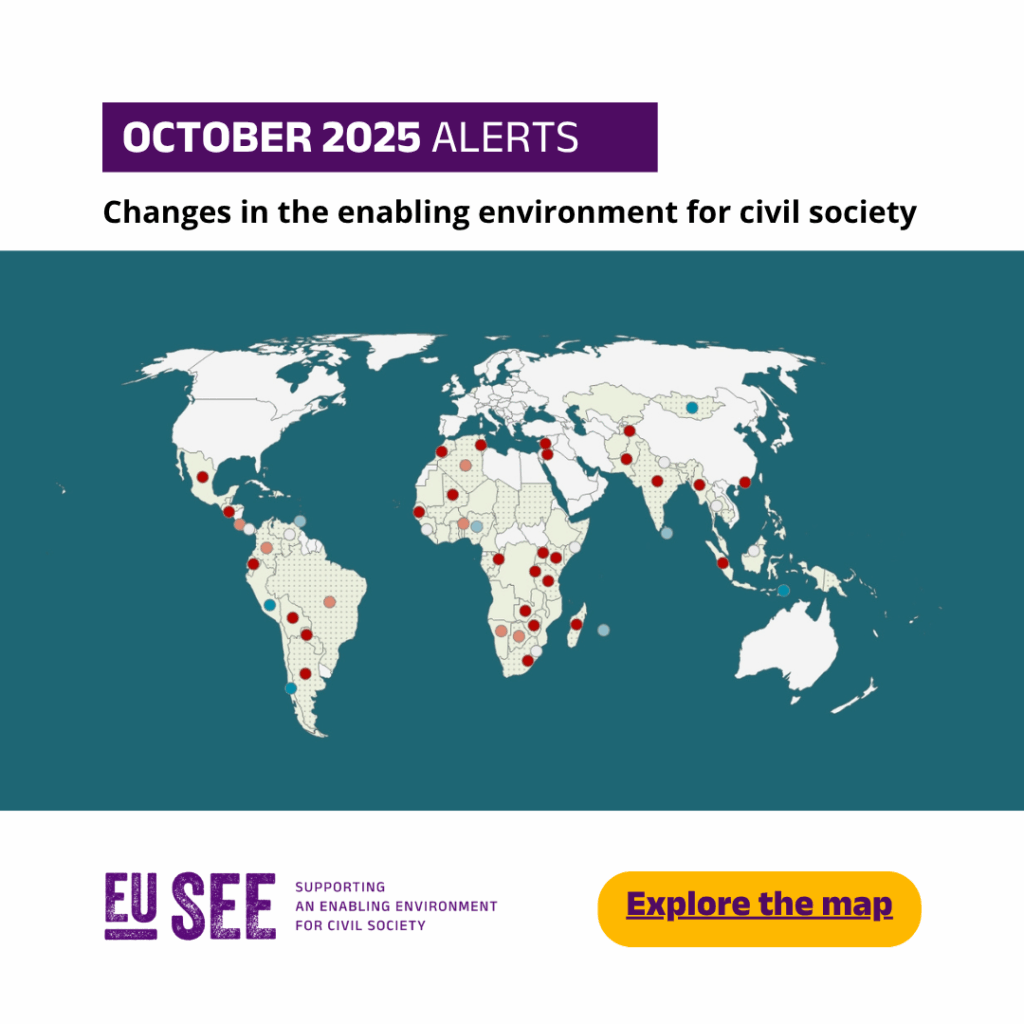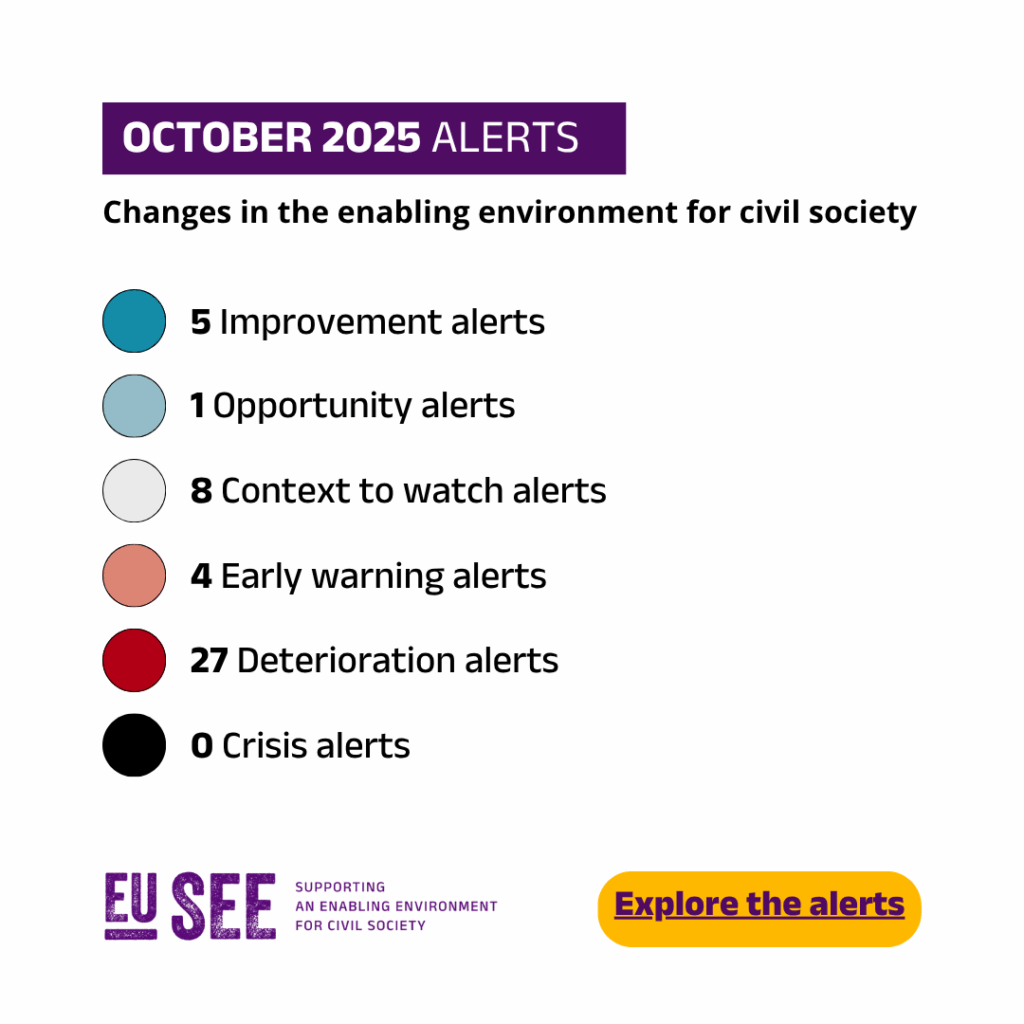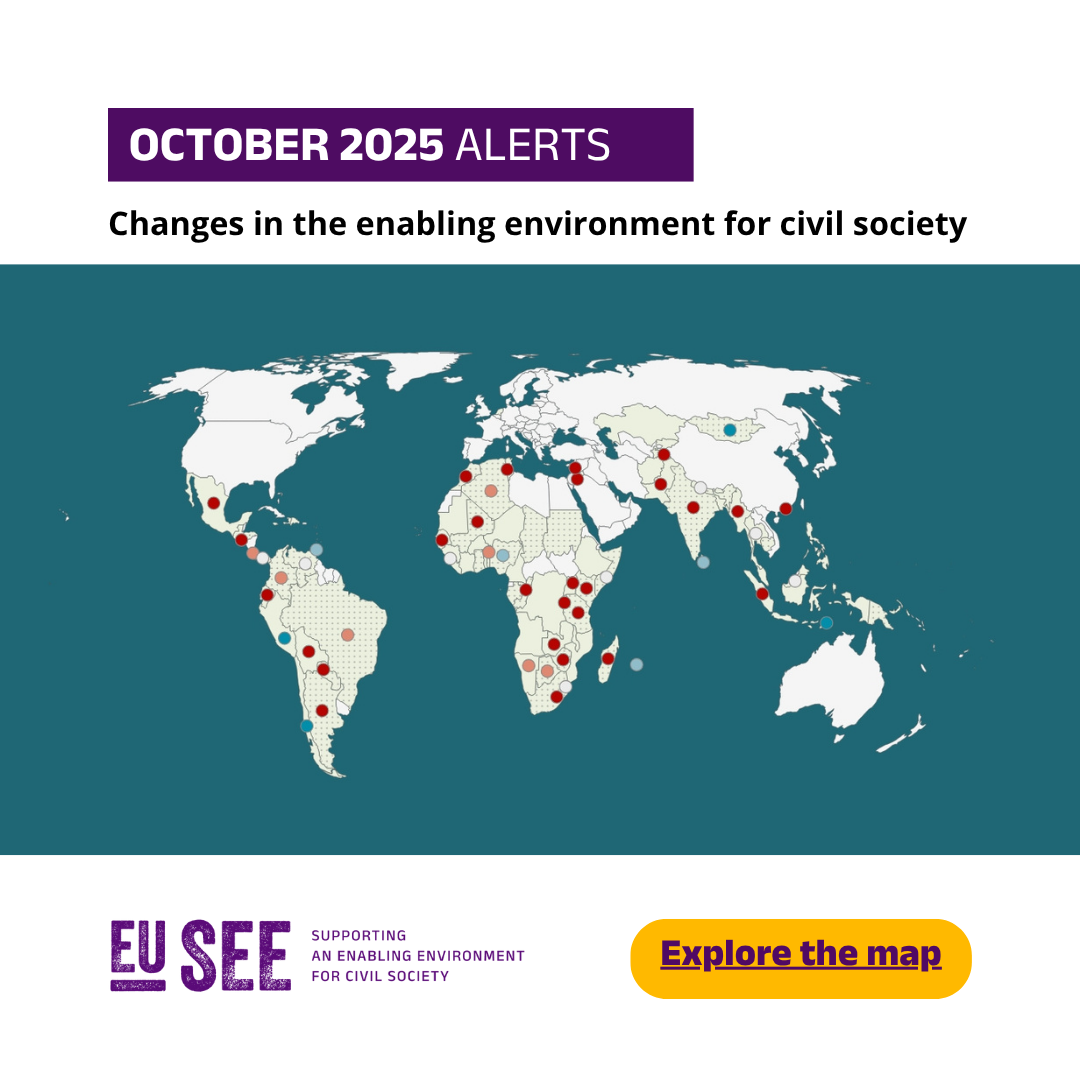45 alerts were published across the EU SEE programme in October, including one crisis alert related to the situation in Madagascar. The end of the month saw a flurry of pertinent enabling environment events, significantly in Madagascar. Election season also had its effect on the enabling environment, with Governments looking to crackdown on protests and selectively interpret laws to restrict dissent. A large cohort of baseline snapshots were published, providing the first in a series of detailed assessments of the enabling environment for civil society in Uganda, Benin, the Philippines, Chad, Ghana and Jordan.


Emerging Trends
Gen Z related protests and youth movements continue to have significant impact on the enabling environment. An alert was issued relating to the violent repression of protests in Madagascar on 25 September in Antananarivo. Due to the EU SEE’s network on the ground, our early warning mechanism was vital in alerting to the high probability of violent protests on the day. Young people from the Generation Z Madagascar movement were key organisers and had planned to gather at Democracy Square in Ambohijatovo (a historic site in the capital and also the designated place for the protest). The security forces, however, blocked their advance and resorted to what were deemed disproportionate measures. Tear gas, rubber bullets, and even automatic rifle fire (AK-47 type) were reported. Gen Z protest movements continue to emerge, with violent repression and arrests made at Gen Z protests in Paraguay. The violent backlash from authorities to Gen Z protests in Morocco led to two casualties, as protestors attempted to storm a police station near Agadir. There is a clear pattern of violent and lethal force being deployed to create a chilling effect and deter protests, which is amplified by authorities that condemn protestors as troublemakers and glorify the perpetrators of violence.
However, Gen Z protests have proven capable of regime change, and violent repression serves to amplify tensions. In the wake of the Nepal crisis, Parliament has been dissolved and an interim government formed with a mandate for new elections; see the advocacy recommendations of our network member here. In the same vein, all eyes were on Ecuador in October. The Government placed restrictions on social organisations, including the freezing of bank accounts of indigenous organisations and the well known environmental organisation, Pachamama Foundation under the new Organic Law on Social Transparency. The Government was accused of the financial suffocation of dissenting groups, particularly those seeking environmental justice. A state of emergency was called in seven provinces. Freedom of assembly has been suspended, resulting the deadly suppression of protests. The Ecuadorian government has deployed states of emergency before as a response to dissent. The wider situation follows a pattern observed in recent months where social unrest, when met with an overly oppressive response from the authorities, can quickly spiral into an existential political crisis.
The enabling environment for civic space continues to be contested in the courts. Due to the impact of El Salvador‘s Foreign Agents Law. FESPAD, established in 1988, FUDESCO, established for 33 years, and the Journalists Association of El Salvador, announced their closure or partial suspension of projects. In India, the Government succeeded in cancelling the registration of SECMOL under the Foreign Contribution Regulation Act. However, the Indian courts dismissed the Government’s attempted revocation of the registration of two Chennai-based CSOs. In recent years and especially the past year, numerous NGOs have faced delays, denials, or cancellations of FCRA licenses in India, often based on procedural or technical grounds rather than proven misuse of funds. The decision marks a rare intervention of the High Court to protect freedom of association.
In Mexico, a reform to the Amparo Law is passing through the Senate that would restrict CSOs from carrying out collective amparos. The government argues that the reform seeks to reduce abuses and streamline processes; however, various CSOs, bar associations, and collectives have warned that the changes are regressive and put effective access to justice at risk. A Draft Law on Associations in Algeria has raised concerns among civil society and led to the issuing of joint statement. This legislative development follows other restrictive measures in 2025, including revisions to the Code of Criminal Procedure and the Law on General Mobilisation, all occurring in a broader context of shrinking civic space. These developments signal a looming deterioration of the enabling environment for civil society in Algeria, particularly affecting freedom of association, expression, and registration, and risk further isolating civil society from democratic processes.
In positive news, in Peru, Proética became the first civil society organisation to be considered an aggrieved party in a corruption case. This ruling sets a clear precedent affirming that civil society organizations have legal standing to defend vulnerable citizens’ rights.
October Country Focus Reports and Snapshots
- Uganda EE Baseline Snapshot
- Chile EE Snapshot (Click here for Spanish)
- Benin EE Baseline Snapshot (Click here for Francais)
- Philippines EE Baseline Snapshot
- Chad EE Baseline Snapshot
- Ghana EE Baseline Snapshot
- Jordan EE Baseline Snapshot
- Bolivia EE Snapshot (Click here for Spanish)
- Pakistan EE Snapshot
- Uganda Country Focus Report
See all EU SEE alerts and subscribe for updates here: https://eusee.hivos.org/alerts
